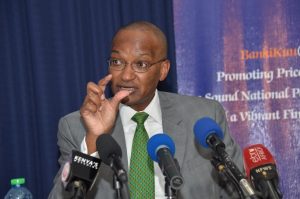The Kenya shilling declined sharply on Wednesday against the US dollar, weighed down by raging political crisis in the country, which saw an electoral commissioner quit days to the October 26 polls.
The currency in the Wednesday trading declined to an average of Ksh 103.4 down from Ksh 103.31 against the dollar in the previous session, a drop blamed on currency speculators, Xinhua reports.
Kenya’s Central Bank quoted the currency at Ksh 103.36 against the US dollar, a low position from the previous day’s Ksh 103.31.
On the other hand, commercial banks quoted the currency at between 103.30 and 103.40, after going down from Tuesday’s close of between 103.20 and 103.40.
Traders in the financial institutions blamed the fall on the worsening political situation, indicating that the currency would continue to take a negative turn affected by politics ahead of the October 26 polls, according to the Chinese news agency.
However, the Central Bank is reported to have sold unspecified amount of dollars to stem the shilling from falling to levels that would disrupt the money market as speculators bought the greenback ahead of the repeat polls.
Kenya’s dollar reserves currently stand at US$7.4 billion, which allow the apex bank to effectively intervene as it did Wednesday to keep the shilling stable.
Political storms
CBK governor Patrick Njoroge, however, remains optimistic the country will weather the ongoing political storms, saying the crisis has made Kenya’s institutions, including the Judiciary, stronger.
In an interview with Bloomberg on Tuesday, he said tight liquidity in the country’s money markets has “nothing to do with the political circumstances.”
International Monetary Fund Resident Representative Jan Mikkelsen, however, says the prolonged political period is increasing anxiety among investors and traders.
The situation was compounded on Wednesday when IEBC commissioner Roselyn Akombe resigned after leaving the country for New York, saying political interference and security threats have made it impossible for the agency to deliver a credible election on October 26, a position that was later affirmed by chairman Wafula Chebukati who stopped short of resigning.
Chebukati said he was giving a chance for political players to dialogue but President Uhuru Kenyatta while on a campaign tour declared he would not engage in any talks since he has no issue with the electoral body.
Raila, at a rally in Kamukunji grounds in Kibra, Nairobi, also declared there will be no elections this month until all officials allegedly involved in rigging the August 8 poll, among other conditions, are removed.
ALSO SEE: Chekubati directs Chiloba team to quit
He declared a restart of street protests on Election Day. But the CBK chief remains upbeat the country and her citizens are resilient enough to survive the uncertainty.
“The current state of affairs is one of high uncertainty, but I think the point here is that it is all political uncertainty, based on recent announcements by the Supreme Court and the sequence of events that followed that,” Njoroge told Reuters in an interview. “I see it as a mark of maturity of the democratic process,” he added.
Kenyans liked “noisy politics” Dr Njoroge said, adding he saw some signs of delays when it came to government spending on big projects. However, this was not excessive and the government was still functioning, he added.
“Kenya is very resilient, and the dynamics we have seen so far underscore Kenya’s resilience,” he said. “We know two things for sure – whoever wins will be a Kenyan, and whoever wins will be supporting market-based policies.”

Asked about the economic impact of the current situation, Njoroge said that the central bank was in the process of revising down its growth forecast.
“Some of this will shave a bit off growth, and some of this will be (government investment) decisions that have been delayed … but bear in mind that the government has continued to function,” he said.
“We still think there isn’t a precipitous collapse in growth, on the contrary we still believe that we will have growth rates above 5 percent,” he said, speaking on the sidelines of a FT Live conference.
Very little intervention
Statistics released in September showed that Kenya’s economy grew 5.0% in the second quarter of the year – a slower expansion than the previous year due to a weaker performance in agriculture, manufacturing and financial services.
Asked about the performance of the Kenyan shilling, Njoroge said the central bank was committed to the flexible exchange rate policy, but had smoothened out excess volatility.
“We have not been intervening in any market way – in that matter we have not deviated from our flexible exchange rate policy, only smoothing out excess volatility as we see it.”
The scale on which the bank had done so was “very, very little” he said, declining to give further numbers.
“It happens, let’s say, once every couple of weeks – if at all.”












Leave a comment